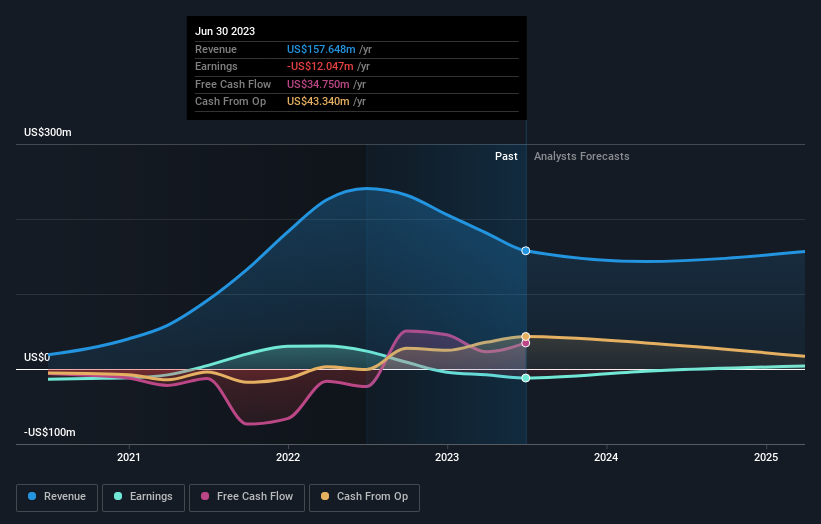- United States
- /
- Leisure
- /
- NasdaqCM:POWW
AMMO, Inc.'s (NASDAQ:POWW) market cap up US$27m last week, benefiting both retail investors who own 51% as well as insiders

Key Insights
- The considerable ownership by retail investors in AMMO indicates that they collectively have a greater say in management and business strategy
- A total of 25 investors have a majority stake in the company with 45% ownership
- Insiders have been buying lately
Every investor in AMMO, Inc. (NASDAQ:POWW) should be aware of the most powerful shareholder groups. The group holding the most number of shares in the company, around 51% to be precise, is retail investors. That is, the group stands to benefit the most if the stock rises (or lose the most if there is a downturn).
While retail investors were the group that benefitted the most from last week’s US$27m market cap gain, insiders too had a 25% share in those profits.
In the chart below, we zoom in on the different ownership groups of AMMO.
View our latest analysis for AMMO

What Does The Institutional Ownership Tell Us About AMMO?
Institutional investors commonly compare their own returns to the returns of a commonly followed index. So they generally do consider buying larger companies that are included in the relevant benchmark index.
As you can see, institutional investors have a fair amount of stake in AMMO. This can indicate that the company has a certain degree of credibility in the investment community. However, it is best to be wary of relying on the supposed validation that comes with institutional investors. They too, get it wrong sometimes. When multiple institutions own a stock, there's always a risk that they are in a 'crowded trade'. When such a trade goes wrong, multiple parties may compete to sell stock fast. This risk is higher in a company without a history of growth. You can see AMMO's historic earnings and revenue below, but keep in mind there's always more to the story.

Hedge funds don't have many shares in AMMO. Steven Urvan is currently the largest shareholder, with 17% of shares outstanding. Meanwhile, the second and third largest shareholders, hold 6.3% and 5.2%, of the shares outstanding, respectively. Fred Wagenhals, who is the second-largest shareholder, also happens to hold the title of Top Key Executive.
On studying our ownership data, we found that 25 of the top shareholders collectively own less than 50% of the share register, implying that no single individual has a majority interest.
While it makes sense to study institutional ownership data for a company, it also makes sense to study analyst sentiments to know which way the wind is blowing. There is some analyst coverage of the stock, but it could still become more well known, with time.
Insider Ownership Of AMMO
While the precise definition of an insider can be subjective, almost everyone considers board members to be insiders. Management ultimately answers to the board. However, it is not uncommon for managers to be executive board members, especially if they are a founder or the CEO.
Most consider insider ownership a positive because it can indicate the board is well aligned with other shareholders. However, on some occasions too much power is concentrated within this group.
Our most recent data indicates that insiders own a reasonable proportion of AMMO, Inc.. It has a market capitalization of just US$260m, and insiders have US$65m worth of shares in their own names. We would say this shows alignment with shareholders, but it is worth noting that the company is still quite small; some insiders may have founded the business. You can click here to see if those insiders have been buying or selling.
General Public Ownership
The general public, mostly comprising of individual investors, collectively holds 51% of AMMO shares. This level of ownership gives investors from the wider public some power to sway key policy decisions such as board composition, executive compensation, and the dividend payout ratio.
Next Steps:
It's always worth thinking about the different groups who own shares in a company. But to understand AMMO better, we need to consider many other factors. For instance, we've identified 1 warning sign for AMMO that you should be aware of.
If you would prefer discover what analysts are predicting in terms of future growth, do not miss this free report on analyst forecasts.
NB: Figures in this article are calculated using data from the last twelve months, which refer to the 12-month period ending on the last date of the month the financial statement is dated. This may not be consistent with full year annual report figures.
New: AI Stock Screener & Alerts
Our new AI Stock Screener scans the market every day to uncover opportunities.
• Dividend Powerhouses (3%+ Yield)
• Undervalued Small Caps with Insider Buying
• High growth Tech and AI Companies
Or build your own from over 50 metrics.
Have feedback on this article? Concerned about the content? Get in touch with us directly. Alternatively, email editorial-team (at) simplywallst.com.
This article by Simply Wall St is general in nature. We provide commentary based on historical data and analyst forecasts only using an unbiased methodology and our articles are not intended to be financial advice. It does not constitute a recommendation to buy or sell any stock, and does not take account of your objectives, or your financial situation. We aim to bring you long-term focused analysis driven by fundamental data. Note that our analysis may not factor in the latest price-sensitive company announcements or qualitative material. Simply Wall St has no position in any stocks mentioned.
About NasdaqCM:POWW
Outdoor Holding
Designs, produces, and markets ammunition and ammunition component products for sport and recreational shooters, hunters, individuals desiring home or personal protection, manufacturers, and law enforcement and military agencies.
Adequate balance sheet very low.
Market Insights
Community Narratives



